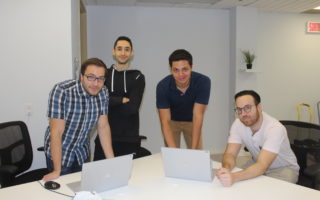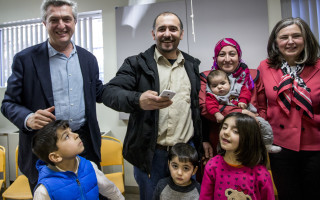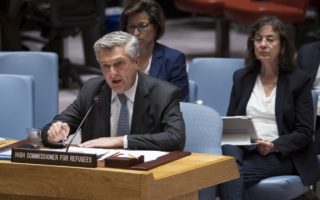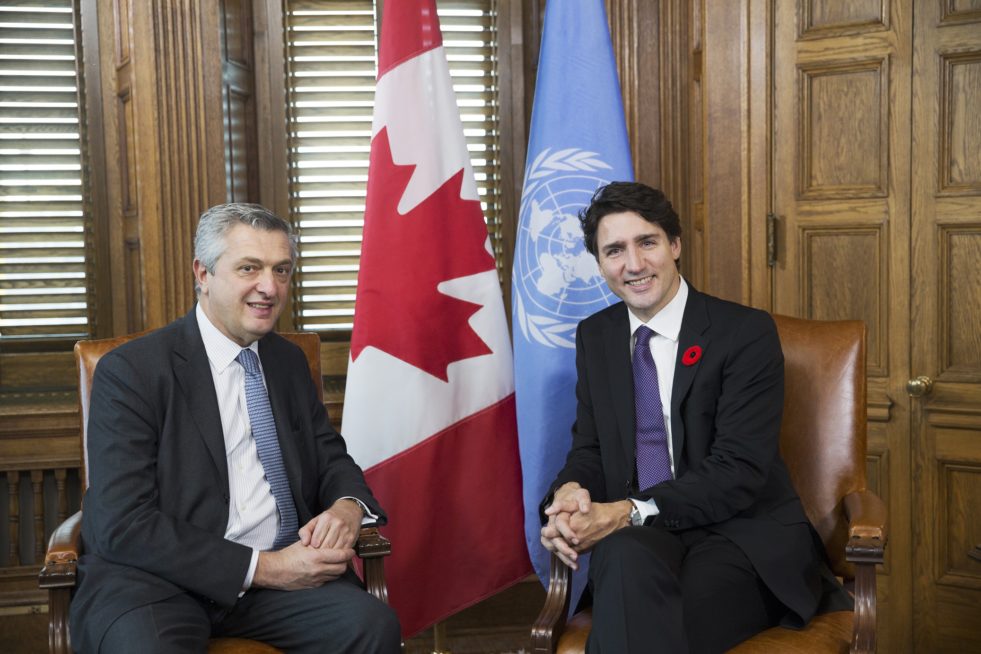
High Commissioner for Refugees Filippo Grandi (left) meets with Prime Minister of Canada Justin Trudeau (right) in Ottawa, during his visit to Canada.
UNHCR’s chief Filippo Grandi has praised Canada for being a “champion” of refugees with its far-sighted and generous resettlement efforts, but in view of a record number of forcibly displaced people worldwide he urged Canadians and others to do even more.
Meeting government officials in Ottawa, he said Canada was among the top 10 donors to UNHCR, the UN Refugee Agency, and told Prime Minister Justin Trudeau he hoped the country would “continue to be a global leader for refugees.”
He stressed last year, only one per cent of the world’s refugees were resettled, while 84 per cent of refugees live in low- and middle-income countries.
“Civilians pay the price of war more than in the past, and women are mercilessly targeted.”
Grandi proposed that Canada, which has adopted a Feminist International Assistance Policy (FIAP), consider doing more for refugee women and girls at risk. The policy is designed to ensure that at least 95 per cent of the country’s foreign aid helps improve the lives of women and girls.
He said this could include increasing the numbers of vulnerable women resettled and supporting more programs for traumatized women who are struggling in refugee-hosting countries.
“Civilians pay the price of war more than in the past, and women are mercilessly targeted,” he said. “They are raped, kidnapped, forced into marriage. We must collectively do more to protect them and help them heal.”
Trudeau says credit “mostly goes to Canadians”.
“I can only take a tiny bit of the credit,” Trudeau replied. “It mostly goes to Canadians who have realized that we’ve built an extraordinary country. People are coming here and building a better future for themselves, and therefore for all of us.”
Two years ago, Canada received global attention when it announced a special program to resettle 25,000 refugees from Syria and the prime minister personally welcomed refugees arriving at the airport.
However, at a time when some countries such as the United States are slashing refugee resettlement numbers, Grandi lamented that only one-tenth of resettlement targets were met last year.
Canada recently pledged to resettle 27,000 refugees in 2018 of which approximately 9,000 are UNHCR-referred resettlements. This is a slight increase on last year, but remains a fraction of the 1.2 million vulnerable refugees UNHCR has identified worldwide who need to be resettled to a third country like Canada.
Countries like Canada offer these individuals a chance at a new beginning and to build the foundation for a new home. UNHCR has already identified 1.2 million refugees who need to be resettled to a third country like Canada, as a life-saving intervention.
During his visit, Grandi recognized Canada’s exemplary resettlement program that also relies on the generosity of private sponsors. He noted that a number of countries are studying the private sponsorship programme as a model that would rely on referrals from UNHCR to target the most vulnerable.
“If we can share some of our solutions and modestly impress upon people there’s a better way to do things, then we’re playing our role,” Trudeau said.
In Ottawa, Grandi also met Public Safety Minister Ralph Goodale and welcomed a directive committing to keeping child asylum seekers out of detention and ensuring families stay together.
The High Commissioner’s four-day visit began in Montreal, where he met Quebec officials to discuss a surge of asylum seekers at the Canada-US border. Accompanied by Jean-Nicolas Beuze, UNHCR’s Canada Representative, Grandi spent time with members of civil society and community organizations, many of which are hoping to improve the resettlement experience.
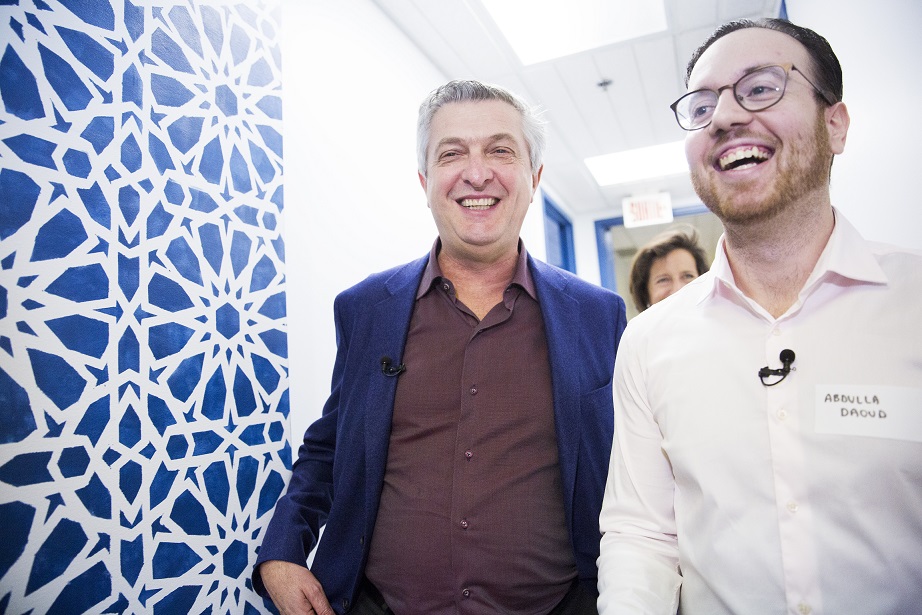
UN High Commissioner for Refugees Filippo Grandi (left) meets DevBloc Executive Director Abdulla Daoud, to hear how the organization is using innovative apps like Luna AI and Compass to help refugees with immigration forms, housing, language classes, family services, academics and community services.
At the Montreal Refugee Centre, a student-led initiative, developers demonstrated new applications meant to better assist refugees in Canada.
“This is an extraordinary project,” said Grandi after watching the demonstrations. “It’s a group of young refugees who are developing technology to help other refugees navigate the asylum system of Canada and start to integrate in society.”
With members of the Montreal business community, he met refugees in the workforce. “Economic integration is key,” Grandi said. “Of course you need a job, you need to be self-reliant. You need to get out of dependency on aid as soon as possible.
“But also work is dignity. Work is identity. Work gives you life.”
To better understand the challenges facing refugees in Canada, Grandi and Canada’s Immigration Minister Ahmed Hussen, himself once a refugee from Somalia, met young people in Ottawa. “I don’t think my story would be possible in any other country,” Hussen told attendees. “[Canada] welcomes people who are seeking a second chance.”
However, some of the young people many of whom came to Canada as refugees themselves, said they believed there was room for improvement.
“A lot of the rhetoric around refugees is that Canada has to help them because they can’t help themselves,” said Efrem Berhe, 23, who fled Eritrea at the age of 14 and arrived in Canada in 2009. “We need to change this.
“Nobody dreams of becoming a refugee. It’s a circumstance that you’re forced to accept.”
Grandi also met refugee students who received full scholarships to study in Canada from Canada’s World University Service. He said refugee scholarships were an important pathway to help young refugees living in limbo in poor countries to have access to higher education.
He travelled to Canada after addressing the UN Security Council in New York, where he urged international leaders to find political solutions to the world’s conflicts and enable the swelling numbers of forcibly displaced people to return home.



